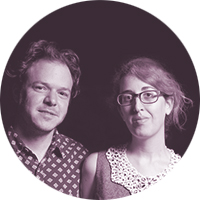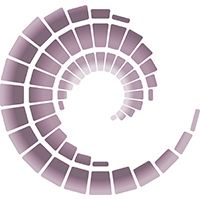
ACADIA 2020 | DISTRIBUTED PROXIMITIES | October 24-30, 2020 | Online + Global
ACADIA Awards of Excellence
Inaugurated in 1998, the ACADIA Awards of Excellence represent recognition, by colleagues worldwide, of consistent contributions and impact on the field of architectural computing. Through 2005, awards were given in three categories: Teaching, Service, and Research. In 2006 an award was added in Emerging Digital Practice and the prior three were renamed as Teaching Excellence, Innovative Research, and Society. In 2007, an additional award for an innovative academic program was added to recognize individual or collective efforts in the establishment of an innovative academic program that contributes to the education of students in the field of digital design. At most one award is presented each year in each category, to an individual or academic program that, in the eyes of the review committee, exhibits "evidence of exceptional and innovative achievement."
ACADIA Award Categories
ACADIA Digital Practice Award of Excellence
This award recognizes creative design work that advances the discipline of architecture through development and use of digital media.
ACADIA Innovative Research Award of Excellence
This award recognizes innovative research that contributes to the field of digital design in architecture. The award distinguishes research with the potential to transform contemporary architecture.
ACADIA Innovative Academic Program Award of Excellence
This award recognizes an innovative academic program that contributes to the education of students in the field of digital design. The award distinguishes one or more individuals responsible for the establishment, success, growth, or management of the academic program.
ACADIA Teaching Award of Excellence
This award recognizes innovative teaching in the field of digital design in architecture. Teaching approaches that can be adopted by other educators are recognized in particular.
ACADIA Society Award for Leadership
This award recognizes extraordinary contributions and service to the ACADIA community.
ACADIA 2020 Award Winners
ACADIA Teaching Award of Excellence

Jane Burry
Professor and Dean, School of Design, Swinburne University (link)
Bio:
Jane Burry is an architect, professor and Dean of the School of Design at Swinburne University of Technology, Melbourne, Australia. She is founding dean for a new practice-centred architecture, urban and architectural engineering program, focused on the future of technology, human and non-human wellbeing and urban ecologies. Lead author of The New Mathematics of Architecture, T&H, 2010, editor of Designing the Dynamic, Melbourne Books, 2013 and co-author of Prototyping for Architects, T&H 2016 she has over a hundred other publications. Her PhD, inspired by research and project architect experience in the technical office at Gaudí’s Sagrada Família Basilica with partner Mark Burry, was titled Logic and Intuition in Architectural Modelling: Philosophy of Mathematics for Computational Design. Recent collaborative research, teaching and postgraduate supervision addresses the interface of architecture with acoustic, thermal and airflow dynamics and the roles of simulation, digital fabrication, rich data gathering and AI in more sustainable and enlivening design.
ACADIA Digital Practice Award of Excellence

Nervous System
Jessica Rosenkrantz and Jesse Louis-Rosenberg, Founders (link)
Bio:
Nervous System is a design studio nestled in the foothills of the Catskill mountains that works at the intersection of science, art, and technology. Designers Jessica Rosenkrantz and Jesse Louis-Rosenberg employ computer simulation to generate designs and digital fabrication to realize products. Their work at Nervous System seamlessly combines scientific research, computer graphics, mathematics, and digital fabrication to explore a new paradigm of product design and manufacture inspired by nature. From 3d-printed lungs to wooden jigsaw puzzles, Nervous System's designs cross disciplinary boundaries.
Nervous System was founded in 2007 after Jessica dropped out of the Harvard Graduate School of Design, and Jesse dropped out of a mathematics degree at MIT. Nervous System's work has appeared on the cover of Science Magazine and is a part of the permanent collections of the Museum of Modern Art, the Cooper–Hewitt, Centre Pompidou and Museum of Fine Arts, Boston.
ACADIA Innovative Academic Program Award of Excellence

DigitalFUTURES Program, Tongji University
(link)
Represented by Co-Organizers Philip F. Yuan, Professor at Tongji University and Founder of Archi-Union Architects, and Neil Leach, Professor at Tongji University, FIU, and EGS
Description:
DigitalFUTURES is a non-profit global platform for research and education addressing the role of the digital in architecture and design. The platform embraces all aspects of the digital, but has a particular focus on computational design and digitally controlled fabrication.
DigitalFUTURES organizes an annual series of activities consisting of workshops, lectures, conferences, publications and exhibitions. Instructors from some of the leading schools of architecture are invited to run workshops, and leading architects and scholars are invited to present papers at the conference. These activities are hosted over the summer months by the College of Architecture and Urban Planning, Tongji University, Shanghai. In 2017 an international PhD program was added. DigitalFUTURES also publishes a series of books related to its activities.
DigitalFUTURES was established by Philip F. Yuan and Neil Leach in 2011. Since then, it has grown steadily in popularity and size. For the 2020 edition, DigitalFUTURES became an online global event called DigitalFUTURES World, hosting over 80 workshops, and attracting over 10,000 applications.
ACADIA Innovative Research Award of Excellence

Sean Ahlquist
Associate Professor, University of Michigan Taubman College of Architecture and Urban Planning
(link)
Bio:
Sean Ahlquist is an Associate Professor of Architecture at the University of Michigan – Taubman College of Architecture and Urban Planning. He directs the CNC Knitting Lab, developing research from computational design thinking to material systems through interdisciplinary, academic and industry partnerships. He teaches as a part of the MSc in Digital Material Technologies (DMT) program, and supervises students in the cluster for Computational Design as part of the PhD program. Ahlquist's research spans writing and practice, seeking to push computational design and material fabrication past its technical challenges in order to engage in discussions of responsivity, sensory feedback and human behavior. In wide-ranging collaborations, with fields such as structural engineering, behavioral science and public education, the work challenges computational design’s often sole focus on precision in order to address architecture’s pressing need to provide individual agency for the under-represented populations often ill-affected by the complexities of our social, civic environments.
ACADIA Society Award for Leadership

Mike Christenson
Professor and Director of Graduate Studies, University of Minnesota
(link)
Bio:
Mike Christenson, AIA, is a Professor of Architecture at the University of Minnesota, teaching in the areas of design fundamentals and digital representation. He is the author of the book Theories and Practices of Architectural Representation (Routledge, 2019), and the Associate Editor for Architectural Computing for the journal Architectural Science Review. Christenson’s research addresses questions of architectural epistemology, concerning how architectural knowledge is produced, structured, and disseminated. His recent work addressing questions of collaborative studio pedagogy advocates changes to traditional practices of jury-based critique. Christenson’s work in industry includes experience at Minneapolis-based Alliiance, on teams in collaboration with Jean Nouvel on the design of the Guthrie Theater on the River and in collaboration with Cesar Pelli on the design of the Minneapolis Central Library. He and Malini Srivastava, AIA, are partners in the award-winning architectural firm Design and Energy Laboratory, LLC, based in St. Paul, Minnesota.